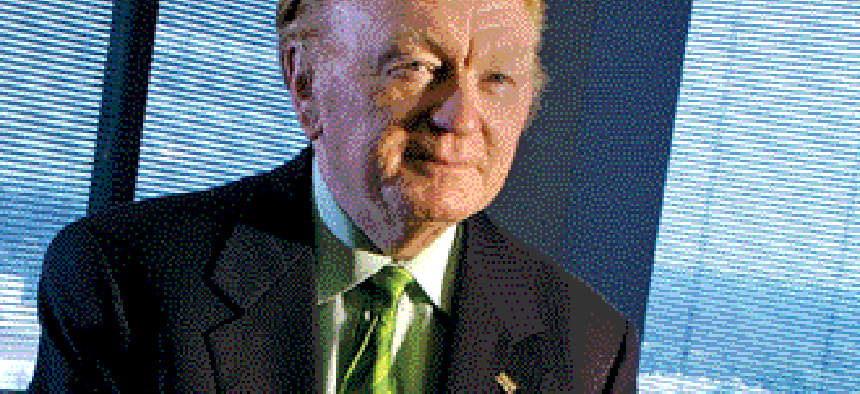Profile: George Pedersen | Expectations exceeded

ManTech's success fulfills George Pedersen's lifelong ambition.
When George Pedersen founded ManTech International Corp. in 1968 with then-partner and mathematician Franc Wertheimer, he admits that his goals and expectations were modest. The Fairfax, Va., company started with a single Navy contract to build sophisticated war-gaming models for the submarine community.Starting the new company had not been a long-term plan for the two colleagues, but a response to hearing that their then-employer, Vitro Corp. of America, had been put up for sale. "When I wrote the business plan, I would have been ecstatic to know that we'd eventually reach $20 million to $25 million in revenue," Pedersen, 70, said.He learned quickly how to think bigger. Over the next 38 years, the Staten Island, N.Y., native's business acumen, work ethic and uncanny ability to reinvent his company's culture and offerings helped ManTech to grow into one of the nation's leading and most reliable defense and intelligence contractors. Today, ManTech earns more than $1 billion in annual revenue, has 6,000 employees in 40 countries and, having gone public in 2002, is well-positioned to be a major player in the continuing consolidation of the government technology services industry.The company's dramatic evolution has been spurred on by Pedersen's well-known enthusiasm for IT and the government IT industry. He likes to refer to his leadership role at ManTech as both his job and his hobby. He has spent most of his career working nights and weekends to ensure his company's ongoing success."It's actually pretty unusual for a company in this industry to become a billion-dollar company with the same CEO at the helm, much less the founder of the company," said Bill Loomis, managing director of Stifel Nicolaus Inc. Loomis is also a Washington Technology columnist.Several key strategies and decisions kept ManTech's revenue from suffering when the Cold War ended and defense budgets dried up, Pedersen said.One of his most important decisions was to rely on acquisitions to grow, a philosophy he put into effect in 1971 with the purchase of an 18-person company that held a Navy Air Systems Command contract. "We grew internally, of course, but acquisitions were a way to leapfrog forward into new areas," Pedersen said.In the early 1980s, for example, ManTech overcame a long unsuccessful run of trying to break into the intelligence community by acquiring for $1.25 million a small company from Raytheon Co. The move gave ManTech four contracts with intelligence agencies and top-secret status. In 1988, ManTech acquired Northrop Services, bringing in new space and environmental business.Another key moment came in the year before the Sept. 11 terrorist attacks. Pedersen took 71 of his key executives off-site for a summit on ManTech's future.Decisions reached at that summit included selling off all commercial business and re-focusing most of the company's efforts and resources on the defense and intelligence markets. Pedersen and his team also decided to go public. "To be honest, I didn't really want to do that, I never did," he said. "But the logic was overwhelming. And it really was the right decision."As a result, ManTech has more than doubled its size in just four years, going from $431 million to over $1 billion in annual revenue. The company has a flow of capital for major acquisitions and has been able to offer stock options to its employees. The latter was particularly compelling to Pedersen, who gives ultimate credit for the company's success to finding and hiring the best technical people in the business.ManTech eventually will grow into a $5 billion company, Pedersen said, but "it's not the number that will be important, but what we'll be doing."With the war on terrorism likely to drag out for at least another 15 years, the real mission, he said, will be to better anticipate the government's needs and get those solutions to the government faster and more efficiently. "It's a work in process right now," he said. "But it's a challenge I think this industry can handle." And one Pedersen plans to be around for."In time, I may give up the CEO title, but I will remain chairman of the board until the day I die," he said. "I love this business. I love what we do every day."Heather B. Hayes is a freelance writer in Clifford, Va.


"Acquisitions were a way to leapfrog forward into new areas," said George Pedersen, ManTech International Corp.
Zaid Hamid

